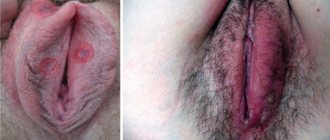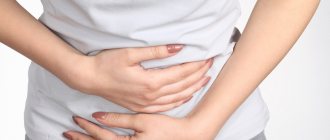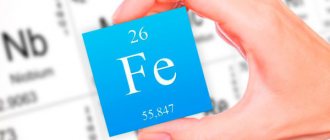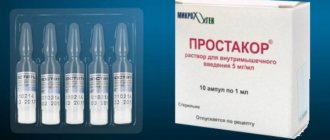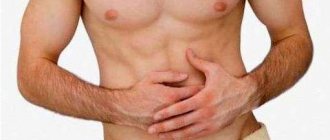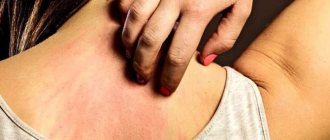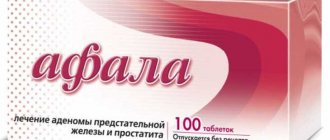Symptoms and signs common to all types of prostatitis
Despite the fact that prostatitis can be acute and chronic, specialists from the site MalePotency.ru have identified a number of common symptoms and signs of the disease in men that are inherent in both conditions: the main first and others.
Moderate pain in the perineum and scrotum
Aching and pulling sensations in the groin are the first sign of prostatitis in men. The symptom bothers me constantly. The pain either increases or decreases. A person cannot accurately indicate the location of the discomfort, since the pain often radiates to the lower back and sacral region.
When a symptom appears, the man tries to sit or lie down, bending slightly and pulling his knees towards his stomach.
To treat discomfort, analgesics from the group of non-steroidal anti-inflammatory drugs (NSAIDs) are used: Ibuprofen, Paracetamol, Analgin. The drugs have a good analgesic effect and do not cause serious adverse reactions.
They are not recommended for use by men suffering from gastritis or stomach ulcers.
Increased urination (pollakiuria)
With prostatitis, a man begins to run to the toilet every 1.5-2 hours. If you drink a couple of liters of beer or too much water in the heat, the condition becomes completely unbearable: the urge occurs every 20-30 minutes.
After going to the toilet there is a feeling of incomplete urination.
With pollakiuria, no pills will help. The option “drink less water” also does not work in this case. The urge can occur even with a tiny amount of urine in the bladder.
Malaise
Weakness and weakness often occur at the very beginning of the disease. Many people do not attach much importance to them, attributing everything to overwork.
If a man after 40 years of age suddenly develops severe fatigue, strange aching sensations in the muscles and joints, and decreased interest in work, this may indicate the development of prostatitis. This symptom alone does not allow diagnosing the pathology, but when combined with 2-3 other symptoms, inflammation of the prostate is very likely.
To improve his well-being, a man needs to rest more and normalize his daily routine. A good night's sleep of 7-8 hours is very important, and you should fall asleep no later than 11 pm. Vitamins will have a good effect both in their natural form and in the form of dietary supplements (use is recommended after an in-person consultation with a specialist).
Sluggish stream of urine
Urination in a stream that is too weak and short, splashing in all directions are typical complaints of men faced with inflammation of the prostate gland. Seeing such a problem, a person tries to strain and squeeze out a “powerful flow,” but nothing comes of it. Prostatitis is characterized by a sluggish stream, not the release of urine in drops, which is more often observed with prostate adenoma in the middle and late stages of its development.
The symptom is primarily associated with swelling or degenerative changes in the tissue of the prostate gland, which blocks the lumen of the urethra. NSAIDs that relieve swelling can provide some relief in an acute process, but in chronic inflammation they will not be effective. You can remove swelling at home with prostate massage, but for this a man must have certain skills.
Mucus discharge from the urethra
Drops of secretion appear on the head of the penis throughout the day. The discharge is caused by self-massage of the prostate, which occurs during fast walking, playing sports, or running. As a result, part of the inflammatory secretion moves along the urethra and is released out. Often the mucus is cloudy, has an unpleasant odor, and sometimes the color leaves much to be desired.
Men experiencing the symptom need to strictly observe hygiene. You should wash your genitals at least 2-3 times a day, since the secretion accumulated on the head is an excellent environment for the proliferation of pathogenic bacteria. The genitals can be rinsed with an antiseptic solution (chlorhexidine) or chamomile decoction, which helps destroy harmful microorganisms.
Pain when urinating
A sign of prostatitis is pain and burning sensations (burning) in the urethra that occur during urination. Discomfort is more pronounced in the morning, since a large amount of inflammatory exudate accumulates in the prostate overnight. Cravings bother a man not only during the act, but also for 15-20 minutes after it.
To reduce discomfort, you can use drugs from the group of herbal uroseptics - Canephron, Lespeflan, etc. The drugs have antimicrobial and anti-inflammatory effects, they relieve symptoms and prevent inflammatory diseases of the urethra due to prostatitis.
Imperative urges
Men characterize this feeling as a sudden and painful urge to urinate. There is a fear of “not making it”, since the sensations are painful and very strong.
Often there is a false urge, when urine excretion does not occur, and after a few minutes the pain subsides. Sometimes this symptom is accompanied by urinary incontinence, when a few drops of liquid appear on the underwear.
The only advice doctors give in such a situation is not to try to endure the urge. Frequent visits to the toilet cause psychological discomfort, but when you try to voluntarily compress the muscles, the pain intensifies.
Diagnostics
To make an accurate diagnosis, a medical specialist first talks with the patient, asking about the signs of the disease, their intensity and duration. The doctor, after conducting a rectal examination, prescribes further examinations using laboratory and instrumental methods.
Laboratory diagnostic methods
To confirm the diagnosis and determine the severity of the condition, the doctor prescribes the following tests:
Blood analysis
General blood analysis . With inflammation of the prostate, an increase in ESR, leukocyte levels, and a shift to the left in the leukocyte formula are observed.
Blood culture tank . This test is prescribed for signs of progressive sepsis, accompanied by debilitating fever.
Analysis of urine . This study allows you to detect pus in urine and bacterial contamination of the prostate.
Urethral smear . It is carried out for the presence of sexually transmitted infections.
In addition, the doctor may prescribe a biochemical blood and HIV test for hepatitis markers.
Instrumental research methods
To clarify the manifestations of the disease, the following methods are usually used:
- Transrectal ultrasound. It is considered a very informative method, but it has a number of contraindications, which are associated with the impossibility of performing prostate massage at certain stages of the development of the disease.
- X-ray of the bladder. For the photo, projections are chosen to make it convenient to examine the prostate gland. Before the procedure, a contrast agent is injected into the bladder.
- Needle biopsy of the prostate. Prescribed to exclude oncological neoplasms.
- Computed tomography allows you to check the pelvic organs.
Thanks to these modern diagnostic research methods, a medical specialist can establish the correct diagnosis, as well as determine the root cause that provokes the formation of pathology.
Based on the examination results, he develops a treatment regimen.
Acute prostatitis: what does it hurt and what does the disease feel like?
Acute prostatitis in men has 9 distinctive symptoms, which are mainly observed with a sharp manifestation of inflammation of the prostate gland. The authors of the site MalePotency.ru will tell you in detail about each.
Excruciating pain in the groin
Men complain of severe pain, spasms and unpleasant pulsation in the groin area.
Soreness bothers a person constantly, intensifies with prolonged sitting in a motionless position, or when urinating. Sometimes the pain is so severe that it is impossible to walk normally.
The symptom occurs suddenly and may be preceded by hypothermia or unprotected sexual intercourse.
Discomfort must be treated. To quickly relieve the symptoms of prostatitis in men, painkillers are used. The drug of choice is NSAIDs: Diclofenac Retard and Ibuprofen are most often used.
Heat
An active inflammatory process in the prostate gland is always accompanied by a rise in temperature. In acute prostatitis, fever reaches 39-39.5°C. Body temperature rises suddenly, sometimes preceding the onset of pain or other typical symptoms.
The symptom may be accompanied by alternating periods of chills and excessive sweating.
Temperatures above 38°C must be brought down. Standard medications are enough - Paracetamol, Ibuprofen. You should not use Aspirin to reduce fever. It has many proven side effects if used incorrectly, so it is better to stick to safe products.
Cloudy urine
With prostatitis, an inflammatory exudate is released from the gland, which appears when urinating.
Because of this, the urine becomes cloudy, and sometimes you can see individual inclusions of mucus or pus in it. Inflammation of the prostate gland is characterized by a change in the last portion of urine, while at the beginning of urination the stream has its usual appearance. Turbidity is often accompanied by an unpleasant odor.
If such a symptom appears, you should use drugs from the uroseptic group. Here, not herbal remedies are better suited, but medications with antibacterial effects, which are more effective specifically in this case. You can use drugs such as 5-NOK, Nitroxoline, Ecomural.
Purulent discharge from the urethra
The appearance of a few drops of pus from the mouth of the urethra is a typical sign of bacterial prostatitis.
The symptom may occur throughout the day and also at the end of each urination. If prostate disease is caused by trichomoniasis, gonorrhea and other sexually transmitted infections, there may be copious discharge of foamy pus with a foul odor.
Symptomatic treatment is carried out with uroseptics. Men are advised to maintain hygiene and regularly wash the groin area with a solution of chamomile or chlorhexidine to prevent irritation and maceration of the skin of the penis.
At the same time, it is important to start antibiotic therapy as soon as possible in order to prevent complications that are fraught with, at first glance, harmless discharge.
Urinary retention
With severe swelling of the prostate gland, urination is impossible, since the lumen of the initial part of the urethra is completely blocked. A man feels the urge to go to the toilet, and there is a bursting feeling in the suprapubic area.
When trying to urinate, the pain intensifies, but there is no result.
Herbal preparations that contain, for example, sabal fruit extract (Prostamol UNO, Prostaplant) help combat urinary retention. They make it easier to empty the bladder and eliminate painful discomfort in the suprapubic area.
Headache
Symptoms of acute prostatitis include manifestations of intoxication. The inflammatory process in the prostate gland is accompanied by the production of specific biochemical markers that affect the condition of the entire body.
The disease is often accompanied by high fever, which also causes a pressing or squeezing headache.
Tablets of Paracetamol, Citramon, Analgin, and Ibuprofen are suitable for pain relief. If the discomfort is not severe, you can do without medication.
Painful bowel movements
When bowel movements occur, there is strong pressure on the inflamed gland, so the man feels sharp pain. Sometimes the pain becomes so intense that a person tries to restrain the urge so as not to feel discomfort.
Occasionally, with prostatitis, tenesmus is observed - an “unsuccessful” painful urge to defecate.
You cannot cope with unpleasant sensations at home. The pain will disappear only after the acute inflammatory process subsides. Do not hold back the urge to have a bowel movement, as constipation may occur, which will worsen the situation.
Pain in the lumbosacral area
The unpleasant symptom of prostatitis is due to the general innervation (supply of nerve endings) of the pelvic organs, due to which the pain spreads to nearby areas of the body.
The pain can be dull and aching or sharp. Also characteristic are sharp “shots” in the lumbar region, which occur when straining, defecating, or urinating.
To eliminate the symptom, painkillers from the NSAID section are suitable. You should not use warm baths or warming up the lumbar area to relieve discomfort, as this can intensify the acute inflammatory and purulent process, accelerating its development.
Body aches
The symptom develops as one of the components of the intoxication syndrome in prostatitis. A man complains of unpleasant sensations in his joints and muscles: it seems as if they are being twisted, stretched and squeezed at the same time.
The feeling is similar to the onset of a cold or flu.
There are no medications or folk remedies to eliminate discomfort. This symptom mainly occurs against the background of fever, so after bringing down the temperature (in any convenient way), the body aches disappear and health improves.
Prostate treatment
Treatment of the prostate in men with adenoma or prostatitis is carried out in a clinic office or in a hospital. This depends on the form of the disease and the presence/absence of associated complications.
The early stage of the disease involves taking various medications. A protracted process and the presence of complications may require surgical intervention by a surgeon.
The goal of drug therapy is to slow down the growth of the gland, reduce its size and the severity of urinary pathology. For this purpose, medications are used that affect:
- hormonal metabolism to reduce pancreatic volume;
- tone of the prostate and urinary tract to facilitate urination.
Herbal preparations are also prescribed.
The dosage and schedule of use are determined by the attending physician, taking into account the patient’s well-being and the characteristics of the pathology.
Diagnosis of chronic prostatitis at home based on signs and symptoms
Chronic prostatitis is distinguished by a number of signs, thanks to which it can be diagnosed at home, even before going to the urologist. The authors of the site MalePotency.ru will introduce you to each of them.
Painful ejaculation
Unpleasant sensations bother a man when approaching orgasm: nagging pain begins in the scrotum and perineum, which radiates to the penis. The discomfort reaches its maximum intensity during ejaculation, when a person may experience sharp spasmodic pain.
This situation is repeated with every sexual intercourse, but the strength of the painful sensations varies.
To reduce discomfort, urologists recommend that men have regular sexual intercourse (at least 2 times a week). This helps eliminate congestion in the prostate gland. After ejaculation, warm sitz baths are useful to eliminate nagging pain.
Frequent night trips to the toilet
Symptoms of chronic prostatitis include nocturia - abnormally frequent urination at night. The patient has to wake up 2-3 times or more to go to the toilet.
The urge to urinate is quite painful; urine discharge is accompanied by discomfort in the perineum and lower abdomen. The symptom may occur regardless of the amount of liquid you drink at night.
There are no symptomatic treatments. To reduce the frequency of night awakenings, you need to limit drinking water and drinks in the evening, and try to completely empty your bladder before going to bed.
Constipation
The prostate gland increases in size and puts pressure on the rectum, making defecation difficult. Men complain of constant constipation lasting 3-4 days or more. When you try to strain, pain occurs in the perineum and sacral region. Symptoms bother a person for several weeks or even months.
To improve bowel movements, doctors recommend eating more vegetables and fruits and whole grain cereals. These foods are rich in fiber, which increases the volume of stool and makes it softer. Prunes, fresh plums, kefir and other fermented milk products have a natural laxative effect. For prolonged constipation, you can use laxative tablets or suppositories.
Low-grade fever
An increase in thermometer readings to 37-37.5°C occurs with exacerbation of chronic prostatitis. In this case, headache, malaise, body aches and other typical signs of illness occur.
The use of antipyretics is not advisable when readings up to 38 degrees on a medical thermometer. The relapse, which actually caused the low-grade fever, should be treated.
Weakening erection
With chronic prostatitis, sexual problems can arise not only in old age, but also in young men after 30 years of age.
Patients complain that during arousal the erection is not hard enough. This causes both psychological and physical discomfort. Because of the fear of “failure,” a man avoids sexual intercourse, which further aggravates the problem.
There are many folk remedies to treat potency problems. Just a few of these: decoctions of thyme and rose hips, tincture of rowan berries, the use of propolis. Men are recommended to eat more celery, which has a good effect on erection, and drink ginger tea.
Decreased performance
With chronic prostatitis, a man feels constant weakness, fatigue, irritability and nervousness.
Concentration and memory inevitably decrease, and it becomes more difficult to perform usual work tasks. The symptom also applies to physical labor: even with minor sports training or exertion, muscle aches and severe fatigue occur.
During such a period, it is important to take care of yourself, get plenty of rest and not try to complete all tasks to the maximum of your capabilities. After treatment of prostatitis (or at least achieving stable remission), the unpleasant symptoms will go away, and then you can plunge headlong into work.
Inability to conceive a child
With asymptomatic chronic prostatitis, men often go to the doctor with the complaint that they are unable to conceive a child.
Patients say that they have no pain or frequent urination, and even sex can be normal. This option for the development of pathology is considered unfavorable, since it means that the man already has an advanced form of the disease.
The formation of viable and active sperm is a serious process that is regulated by the gonads and the brain. No folk recipes or symptomatic remedies will help in this case; it is important to study and solve the problem at a medical level.
Causes of inflammation
The prostate can increase in size during inflammation initiated by microorganisms: viruses, bacteria, mycoplasmas, trichomonas, fungi and chlamydia. Inflammation is often accompanied by prostate diseases such as vesiculitis, urethritis, hyperplasia (after 50 years).
Bacterial contamination occurs when the pathogen enters the organ through the blood and lymphatic channels from the bladder, rectum or urethra. Therefore, all inflammatory foci in nearby tissues and organs should also be subjected to timely treatment. The size of the prostate may increase with:
- inactive lifestyle;
- severe hypothermia;
- imbalance in the sexual sphere;
- poor nutrition;
- susceptibility to bad habits.
The listed factors are provoking the appearance of signs of acute or permanent prostatitis. (Fig. 3)
Reviews: the opinion of men on forums
Stanislav, 48 years old:
“Signs of prostatitis appeared more than a year ago. At first there was a slight tugging in the groin and perineum, then the pain became stronger. I noticed that I wake up 2-3 times at night to go to the toilet. I didn't pay much attention to it. I thought I was frozen somewhere or sat in a draft. Then problems with sex began: the erection was unstable, sensitivity decreased, and there were no vivid sensations during orgasm. At work, a colleague recommended dead bees. I took it for several months (in the form of a tincture, bought from a local beekeeper), my condition improved, the pain disappeared.”
Bogdan, 29 years old:
“I had pain in the scrotum, perineum, and pulling in my lower abdomen. Sometimes a couple of drops of pus were released from the urethra. I read reviews on the Internet where men described the same symptoms, went to the doctor and they were diagnosed with prostatitis. I know that the disease is serious, so I decided not to delay treatment. At the hospital they did a bunch of tests and ultrasounds and prescribed pills. The prostatitis was cured, but problems with the intestines began, probably due to antibiotics. Then for another 2 months I had to buy probiotics, then all sorts of kefirs and yoghurts to relieve the discomfort in the stomach.”
Alexander, 51 years old:
“For a long time I thought I had some kind of digestive problem. I didn’t even know about prostatitis - I didn’t know that the lower abdomen hurt and the stool was disturbed. I had exactly these symptoms. I also began to go to the restroom more often, but at first I didn’t pay attention to this sign. It’s good that I finally decided to go to the urologist. I was diagnosed with chronic prostatitis. I was treated for a long time, took different pills, put suppositories. To be honest, I don’t even remember the names, it somehow slipped my mind. I feel good now.”
Yuri, 40 years old:
“I know firsthand what prostatitis is. It all started suddenly for me: severe pain appeared in the scrotum and suprapubic area, and I had the urge to urinate literally every 30 minutes. I suffered for a couple of days and went to the urologist. There they did a urine test and an ultrasound of the prostate, took a smear, and the doctor also wanted to look rectally at what was there with his finger, but I refused, in general... It turned out that “acute prostatitis” had developed. The doctor prescribed antibiotics. After 2 weeks I was completely cured, there have been no relapses so far, I hope there won’t be any in the future, it’s scary, because they say that prostatitis is incurable.”
Diagnosis
To confirm the fact of inflammation of the prostate gland, you need to visit a urologist or andrologist. During the consultation, the doctor conducts an examination, studies the symptoms, and interviews the patient in detail to identify the factors that provoked prostatitis. The specialist must conduct a rectal examination, that is, 1 finger is inserted into the patient’s anus in order to feel the prostate. The patient's reaction to the procedure and the presence of a protruding organ can indicate the intensity of the disease. Then a number of effective diagnostic methods are carried out:
- Ultrasound of the prostate and nearby organs. Allows you to accurately determine how damaged the gland tissue is and its size.
- Antibioticogram. A smear from the mucous membrane of the gland is examined for the presence of sexually transmitted infections. A bacteriological analysis of urine is also carried out. The results obtained make it possible to identify the causative agent of the disease and determine the degree of its sensitivity to antibiotics.
- Determination of the amount of sex hormones in the blood. If there are few of them, then the prostate is not able to fully perform its functions. And excess levels of hormones lead to the proliferation of gland tissue, which is also a deviation from the norm.
- Uroretrografiya. The procedure is necessary if the disease is recurrent. A radiopaque substance is injected into the urethra, and then several photos of the organ are taken.
In andrology, the diagnosis of prostatitis is more necessary to establish the root cause of the disease, because the patient himself may be mistaken about the factors that led to the inflammatory process.
Using effective methods, the urologist will determine the true picture of the disease and prescribe the correct treatment.
conclusions
For any form of prostatitis, the use of symptomatic therapy alone is not effective enough. NSAIDs or analgesics will temporarily relieve pain and fever, and uroseptics will help reduce microbial inflammation. But at the same time, the pathological process in the prostate gland continues to develop and becomes chronic. As a result, echographic changes appear (tissue sclerosis), erectile dysfunction, and the risk of prostate cancer increases.
In order not to lead the disease to tragic consequences, complex treatment of prostatitis is required. The therapeutic regimen is prescribed by a doctor (urologist, less often - andrologist) taking into account the characteristics of the disease and test results.
Absorption function
The prostate gland, like the epididymis, seminal vesicles, and ampulla of the vas deferens, reabsorbs testicular secretions and has the ability to resorb secretions produced by its own epithelium.
Absorbed into the bloodstream, the secretion of this gland inhibits the function of the testes, and also has a depressing effect on mental and physical performance. The pancreas is in structural and functional unity with the accessory reproductive glands, which is convincingly proven by the works of A. Sikorski (1983). In the long term after prostatectomy, the author discovered histological elements of the removed organ in the accessory gonads of rats.

